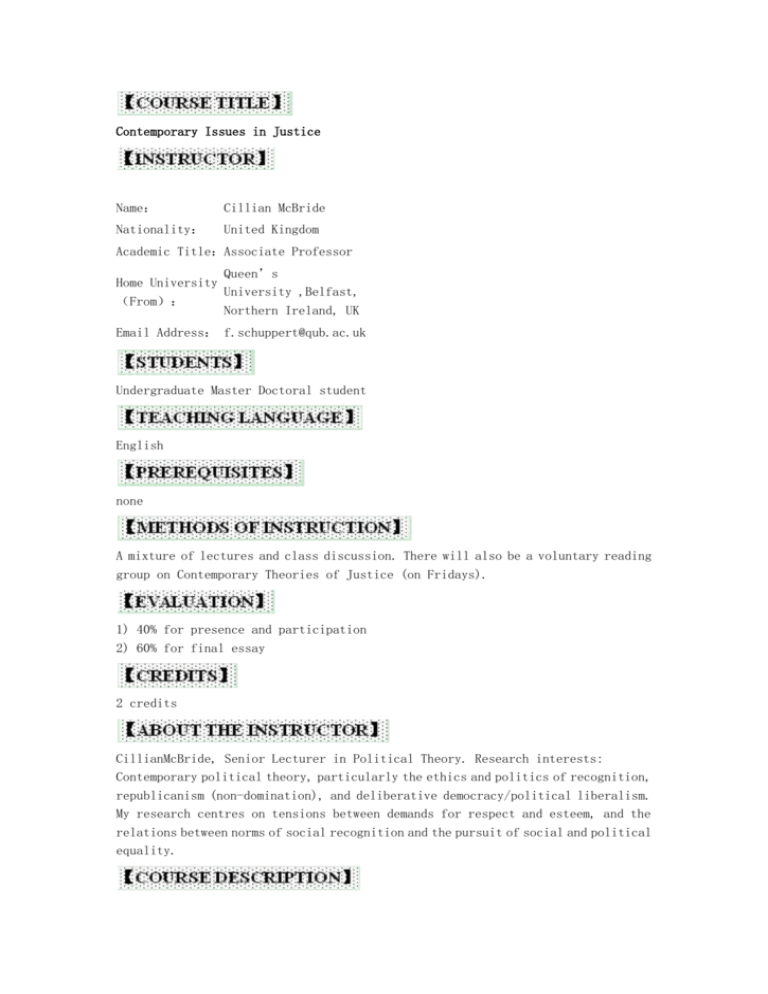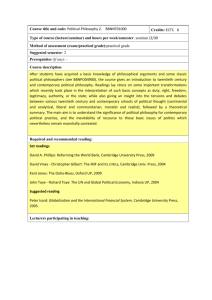SH1521
advertisement

Contemporary Issues in Justice Name: Cillian McBride Nationality: United Kingdom Academic Title:Associate Professor Queen’s Home University University ,Belfast, (From): Northern Ireland, UK Email Address: f.schuppert@qub.ac.uk Undergraduate Master Doctoral student English none A mixture of lectures and class discussion. There will also be a voluntary reading group on Contemporary Theories of Justice (on Fridays). 1) 40% for presence and participation 2) 60% for final essay 2 credits CillianMcBride, Senior Lecturer in Political Theory. Research interests: Contemporary political theory, particularly the ethics and politics of recognition, republicanism (non-domination), and deliberative democracy/political liberalism. My research centres on tensions between demands for respect and esteem, and the relations between norms of social recognition and the pursuit of social and political equality. This course offers participants a comprehensive overview of 20th century and contemporary theories of justice. The course offers an introduction to, and in-depth discussion of, the major contributions to the debate. In so doing, the course allows students to get a systematic understanding of the different dimensions of and contemporary issues in justice. Based on the assigned readings of core texts, lectures and in-class discussions the participants will acquire an excellent understanding of the main normative theories and their respective strengths and weaknesses. In addition, the course offers a complementary reading group segment, in which we will discuss in further detail some key-texts on contemporary issues of justice. Overall, the aim of the course is to equip students with up-to-date in-depth knowledge of contemporary theories of justice and to encourage critical debate on related issues. The course is designed to deal with justice as a phenomenon across time and space. Thus, the course offers special lectures on retributive justice, rectificatory justice and intergenerational justice, as well as lectures on global justice, and justice and the environment. Moreover, the course features a series of sessions on core-issues in the debate on social and distributive justice, such as justice and responsibility, the relationship between justice and democracy, as well as justice and recognition theory. On top of that, the course will be complemented by three lectures on classical approaches to justice, each one connected to a particular commitment in moral theory, namely, libertarianism, consequentialism and contractualism. Week 1. Introduction; Course Outline 导论,课程大纲 Moral Theories and Justice I: Consequentialism, Utilitarianism 道德理论和正义 I:后果主义和功利主义 Moral Theories and Justice II: Contractualism 道德理论和正义 II:契约主义 Moral Theories and Justice III: Libertarianism, Natural Rights Theories 道德理论和正义 III:自由至上主义,自然权利理论 Week 2. Egalitarianism, Prioritarianism and Sufficientarianism 平等主义,优先主义和充分论主义 Justice and Responsibility: Luck-Egalitarianism and Beyond Justice and Culture 正义与责任:运气平等主义,超越正义和文化 Justice and Recognition Theory 正义与认同理论 Week 3. The Currency of Justice 正义的潮流 The Site and Range of Justice 正义的位置与范围 Justice and Democracy: equality and freedom 正义与民主:平等与自由 Global Justice 国际正义 Week 4. Rectificatory Justice: Key Ideas & Historic Wrongs 矫正正义:主要观点和历史过错 Retributive Justice: Punishment, Mercy and Forgiveness 分配正义:惩罚、怜悯与宽恕 Intergenerational Justice 代际正义 Concluding Student Debate; Summary 总结学生讨论。尾声 We will provide a digital e-reader containing all the relevant texts in pdf format ahead of the course. • Ackerman, Bruce A., 1980, Social Justice and the Liberal State, New Haven: Yale University Press. • Alstott, Anne and Bruce A. Ackerman, 1999, The Stakeholder Society, New Haven: Yale University Press. • Arneson, Richard, 1990, “Liberalism, Distributive Subjectivism, and Equal Opportunity for Welfare,” Philosophy and Public Affairs, 19: 158–194 • Arthur, John and William Shaw (eds.), 1991, Justice and Economic Distribution 2nd Ed., Englewood Cliffs, NJ: Prentice-Hall. • Barry, Brian, 1965, Political Argument, London: Routledge and Keagan Paul. • Barry, Brian, 1989, Theories of Justice (Volume 1), Berkeley: University of California Press. • Barry, Brian, 1988, “Equal opportunity and moral arbitrariness,” in Equal Opportunity, Norman E. Bowie (ed.), Boulder and London: Westview Press, 23–44. • Cohen, G.A., 1997, “Where the Action Is: On the Site of Distributive Justice,” in Philosophy and Public Affairs, 26: 3–30. • Cohen, G. A., 1995, Self-Ownership, Freedom, and Equality, New York: Cambridge University Press. • Cohen, G.A., 2000, If You're an Egalitarian, How Come You're so Rich?, Cambridge, MA: Harvard University Press. • Daniels, Norman (ed.), 1975, Reading Rawls: Critical Studies of A Theory of Justice, Oxford: Basil Blackwell. • Dworkin, Ronald, 1981, “What is Equality? Part 1: Equality of Resources,” Philosophy and Public Affairs, 10: 185–246. • Dworkin, Ronald, 1981, “What is Equality? Part 2: Equality of Welfare,” Philosophy and Public Affairs, 10: 283–345. • Dworkin, Ronald, 2000, Sovereign Virtue, Cambridge, MA: Harvard University Press. • Feinberg, Joel, 1970, “Justice and Personal Desert,” Doing and Deserving, Princeton, NJ: Princeton University Press, 55–94. • Gauthier, David, 1987, Morals by Agreement, Cambridge: Cambridge University Press. • Goodin, Robert E., 1995, Utilitarianism as a Public Philosophy, New York: Cambridge University Press. • Kymlicka, Will, 1990, Contemporary Political Philosophy, Oxford: Clarendon Press. • Miller, David, 1999, Principles of Social Justice, Cambridge, MA: Harvard University Press. • Okin, Susan Moller, 1991, Justice, Gender and the Family, New York: Basic Books. • Parfit, Derek, 1986, Reasons and Persons, Oxford: Oxford University Press. • Rawls, John, 1971, A Theory of Justice, Harvard, MA: Harvard University Press. • –––, 1993, Political Liberalism, New York: Columbia University Press. • –––, 1999, Collected Papers, Sam Freeman, (ed.), Cambridge: Harvard University Press. • –––, 2001, Justice as Fairness: A Restatement, Cambridge: Harvard University Press. • Roemer, John E., 1996, Theories of Distributive Justice, Cambridge, MA: Harvard University Press. • Scheffler, Samuel, 2001, Boundaries and Allegiances, Oxford: Oxford University Press. • Schmidtz, D. 2006, Elements of Justice, Cambridge: Cambridge University Press. • Sen, Amartya, 1982, “Equality of What?,” in A. Sen, Choice, Welfare and Measurement, Cambridge: Cambridge University Press. • Steiner, H., 1981, Liberty and Equality, Political Studies, 29: 555–569. • Vallentyne, Peter, 1997, “Self-Ownership and Equality: Brute Luck, Gifts, Universal Dominance, and Leximin,” Ethics, 107: 321–343. • Walzer Michael, 1984, Spheres of Justice, New York: Basic Books.







